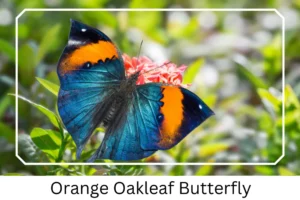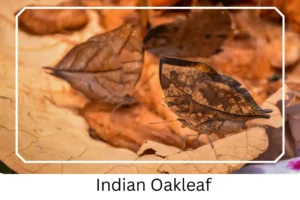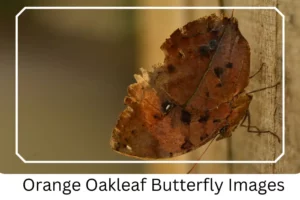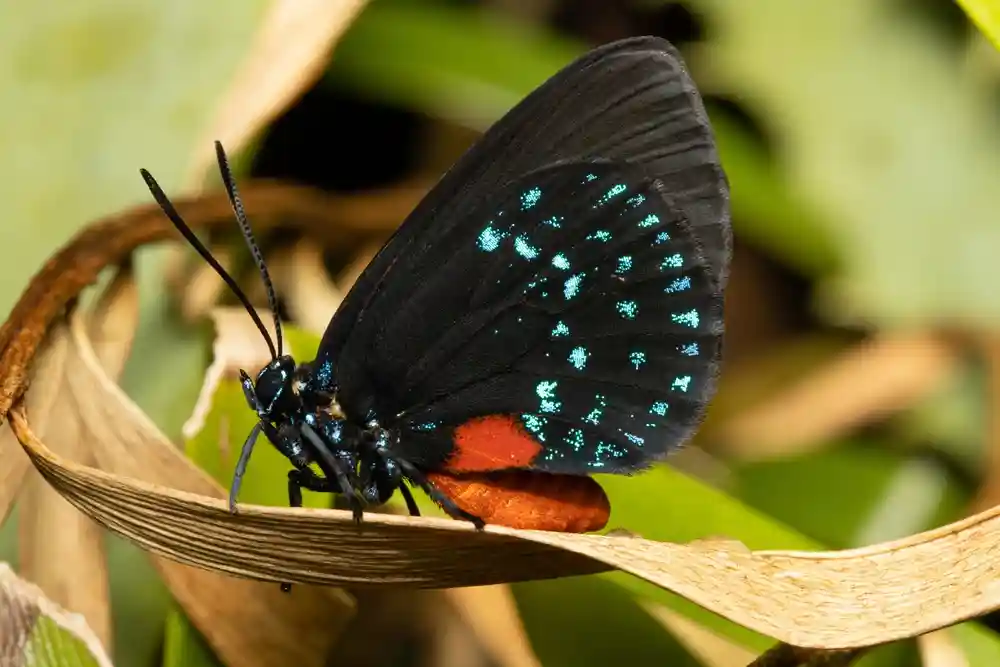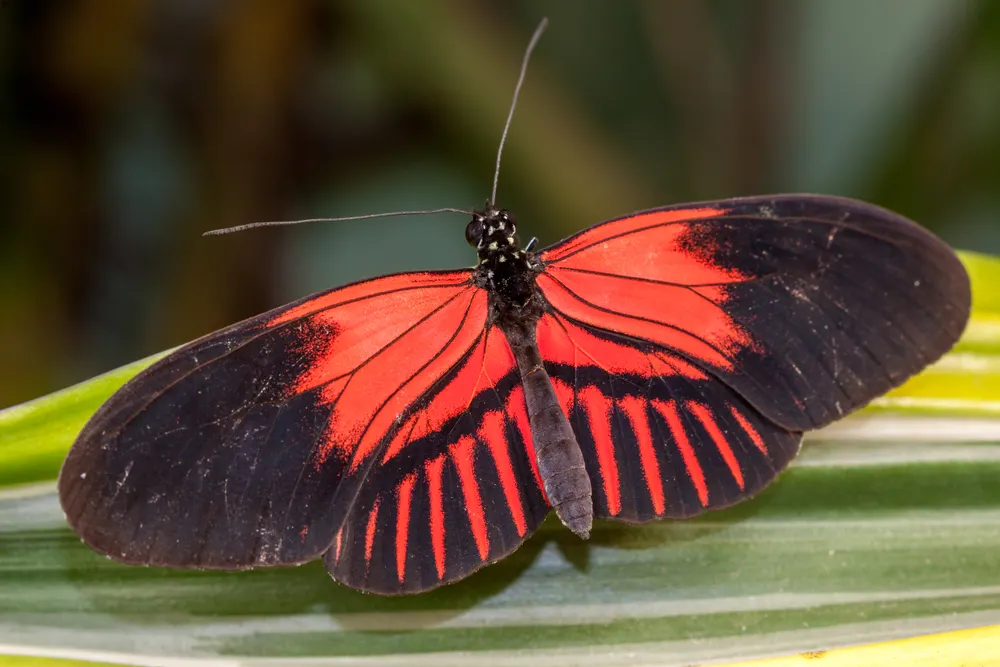Orange Oakleaf (Kallima inachus)
The Orange Oakleaf butterfly, a marvel of the insect world, is renowned for its vibrant colors and astonishing camouflage capabilities. Indigenous to Tropical Asia, this species thrives from the Indian subcontinent all the way to Japan. Its unique ability to mimic dry, dead leaves not only fascinates observers but also serves as a vital survival strategy in its natural habitat.
Scientific Classification
- Family: Nymphalidae
- Genus: Kallima
- Common names: Dead Leaf, Indian Oakleaf
- Scientific Name: Kallima inachus
Overview
Belonging to the Nymphalid family, the Orange Oakleaf is a testament to nature’s artistry and adaptability. This butterfly’s lifecycle, from the visually striking caterpillar to the deceptive adult form, showcases nature’s intricate designs aimed at survival and reproduction. Through each stage, the Orange Oakleaf exhibits distinctive features that captivate and educate enthusiasts and scientists alike.
Description and Identification
Caterpillar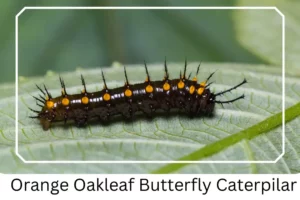
The Orange Oakleaf’s caterpillar stage presents a velvety, black body adorned with long, yellowish hair, interspersed with red spines. This formative stage is crucial for growth, with the caterpillar feeding voraciously on host plants.
Pupa
Transitioning to the pupa stage, it assumes a light brown color with slaty irrorations. Small, conical points emerge dorsally on the abdomen, and the thorax gently keels, signaling the impending metamorphosis.
Adult Butterfly
Sexual Dimorphism: Sexual dimorphism is present, with subtle differences discernible between males and females, particularly in the coloration and pattern of their undersides.
Color and Appearance: In its splendor, the adult butterfly’s wings reveal deep blue bases, topped with black and highlighted by an orange stripe, creating a stunning visual contrast. Two white oculi enhance this palette, with one perched atop the black band and the other near the blue-orange demarcation. The hind wings display a serene blue, bordered with brown patches. Closed, the butterfly transforms into a dead leaf, a masterpiece of mimicry.
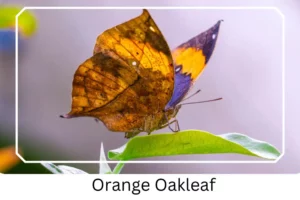
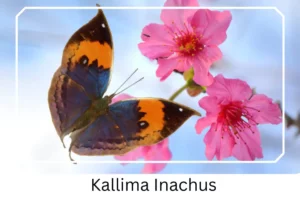 Average Wingspan: The wingspan of the Orange Oakleaf ranges between 85-110 mm (3.3-4.3 in), supporting its fast and erratic flight pattern.
Average Wingspan: The wingspan of the Orange Oakleaf ranges between 85-110 mm (3.3-4.3 in), supporting its fast and erratic flight pattern.
Flight Pattern: The flight of the Orange Oakleaf is both fast and erratic, an adaptation that likely helps avoid predators through unpredictability.
Eggs
In controlled environments, a female can lay an average of 280 eggs, indicating the species’ potential for rapid population growth under optimal conditions.
Quick Facts | |
| Distribution | Ranges across India, Bhutan, Nepal, Bangladesh, Myanmar, Thailand, Taiwan, China, Laos, Vietnam, and Pakistan, including the Tenasserim Hills. |
| Habitat | Prefers dense forests with heavy rainfall, dense undergrowth, and stream beds. Over-ripe fruits and tree sap are significant attractants. |
| Lifespan of Adults | Remains unspecified. |
| Host Plants | Varies regionally, including families such as Urticaceae, Polygonaceae, Rosaceae in India, and specific plant species in China and Japan. |
| Adult Diet | Primarily consists of rotten fruits found on the forest floor. |
How to Identify Orange Oakleaf?
Identifying an Orange Oakleaf butterfly requires keen observation. Look for its distinct wing pattern when spread: a deep blue base with a black top separated by an orange stripe, and two white oculi adding to its unique appearance. The transformation into a leaf mimic when the wings are closed is the most distinctive feature; shades of yellow, black, brown, biscuit, and buff on the underside perfectly emulate a dead leaf. Notably, the females exhibit a reddish tint on their undersides with paler yellow markings, distinguishing them from the males. Observing these butterflies in their natural habitat, especially during their flight or when they’re perched, provides the best opportunity for identification.
Did You Know?
- The Orange Oakleaf is considered rare in China, prompting ongoing research into its captive breeding.
- Predominantly preyed upon by birds, this butterfly adopts a stationary posture, blending into the foliage to escape detection, effectively mimicking a dried leaf.
- The species exhibits polyphenism, showing variations in color and size between dry and wet seasons, which may contribute to its survival strategy by adapting its appearance to seasonal changes.
Conclusion
The Orange Oakleaf butterfly stands as a fascinating subject for study and observation, embodying the complexity and beauty of nature’s designs. Its lifecycle, marked by distinctive stages and survival strategies, offers insights into the adaptability and diversity of butterfly species across Tropical Asia. As we continue to explore and understand these creatures, their existence enriches our knowledge of biodiversity and the intricate ecosystems that sustain it.
Orange Oakleaf Pictures

Scientific Classification

- Family: Nymphalidae
- Genus: Kallima
- Common names: Dead Leaf, Indian Oakleaf
- Scientific Name: Kallima inachus

